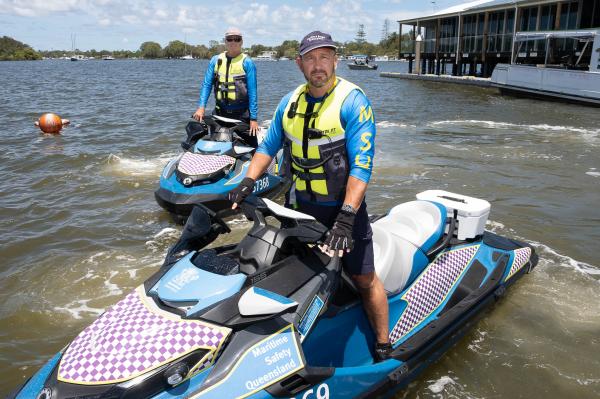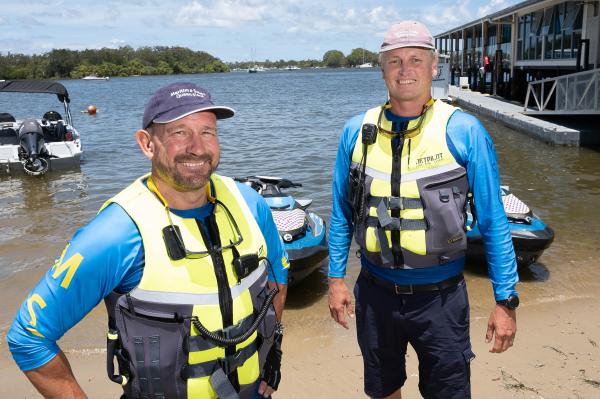The Noosa River saw its first full Maritime Safety Queensland compliance blitz over the Australia Day holiday period, with MSQ, the Water Police and Boating and Fisheries officers issuing helpful advice, warnings and hefty fines as thousands of holidaymakers hit the water over the four-day break.Although this was the first time we’d seen the Maritime Enforcement Team in action since MSQ stepped up its presence in Noosa last year, it won’t be the last. The MET team of 10 divides its time between many of Queensland’s most popular waterways, but Noosa is now on its priority list and the team will be back in Noosa at Easter, if not before.
Between water patrols MSQ general manager Angus Mitchell and Noosa Marine Officer Jake Hennessey shared the Noosa Today Hotseat while PHIL JARRATT asked the questions.
This weekend we’re seeing the first Maritime Enforcement Team in action in Noosa. Can you explain what that means?
ANGUS: One of the things I was determined to do when I came to MSQ was to increase our presence on the waterways, particularly in the areas that present the greatest risks, that are growing at the greatest rate in terms of recreational boating and personal water craft. Areas like the Gold Coast, Moreton Bay, and, of course, Noosa. That led firstly to establishing our office here in Noosa in line with the increasing importance of this waterway, but equally in line with increasing concerns from the local community about the level of use of the waterways over holiday periods. We recruited Jake Hennessey from NSW to head up our office here and he’s become part of the local community so that he can understand local issues and get to know the commercial and tourism operators as well as the fishing and boating clubs. The idea is to solve issues at a local level rather than with a whole of state response.
The Maritime Enforcement Team came into operation about a year ago so that we could bolster the number of officers in areas as they are needed. Australia Day is one of the busiest times on our waterways, so at the moment we have 10 trained officers throughout the state and we bring them together at peak times such as holiday weekends or boating and fishing competitions. They work all over the state but the concentration is on our busiest waterways from the Tweed to Noosa. We’ve teamed up with Water Police and Boating and Fisheries to do patrols in all these places.
People who live by the river or use it on a daily basis seem to agree that this Covid-impacted summer holiday period has been the worst ever for crowds on the water and speeding and other infringements. Do your patrols back that up?
Yes, the figures we have in relation to the patrol hours we’ve had to do and the numbers of cautions, warnings and infringement notices we’ve had to give is certainly up, noting that we’ve only had a presence on the river here for 10 months, so we don’t have great historical data yet. This has been our first busy season since we’ve had Jake here. We need to look at what are the most common offences here and what do we do about them going forward. We’re looking at modifications like increasing signage, particularly at boat ramps, to educate people about the regulations, changing out some of the navigational markers to improve their visibility, we’ve already got the electronic speed sign near the Fisheries office [at Munna Point]. We’re taking it step by step, and we’re now working with Noosa Council to establish this community reference group [Noosa River Stakeholder Advisory Committee].
What outcomes are you hoping to see from that committee?
I think mainly to make sure that the represented groups understand what we’re trying to achieve here so that we can benchmark what the community wants to achieve as well, and also we want it to help us understand specific local issues, because every waterway has different issues. We want to be responsive to that.
Going back to safety, it’s going to take time before we see big improvements because a lot of it is behavioural change. It’s not just a matter of coming in and writing a lot of tickets and job done. I know since Jake started he’s spent a lot of time making phone calls and talking to parents about the historic problems of kids and tinnies that we’ve had in Noosa. You don’t see the benefit of that kind of work immediately, but we’re here for the long haul.
Jake: If I observe a safety breach I’ll talk to the kid driving the boat and take his particulars, then phone his parents to let them know about the breach and that he’s on a watch list for the future. If the safety message isn’t cutting through I cite the example from last February when a young lad in a tinnie collected a kayak containing a father and two children just off The Boathouse, causing injuries to the father. That matter is still before the courts, with the family of the driver being sued for damages. I’ve spoken to literally hundreds of parents since I started here, and that’s the messaging they’re getting, and I’ve noticed a reduction in the number of complaints we’re receiving, and the anecdotal evidence also supports that.
From the evidence you’re both gathering, is the juvenile “river rat” problem any worse here on the Noosa River than elsewhere?
Angus: It’s certainly prevalent on the Gold Coast as well, where we work closely with the police, but we’re also mindful that they come under the area of juvenile offenders, so there are a number of steps that we go through. Ultimately what we want is for everyone to be safe. We don’t want to come down with a big stick on any part of the boating community. It’s about letting parents know what craft they’ve bought, its capabilities and the importance of teaching their sons and daughters how to operate it and how to behave responsibly on the water, or be liable for something that could be more than your house is worth.
On the Gold Coast we’ve identified repeat offenders but we’re also putting programs in place to address behaviour issues. When the level of behaviour rises, so does the level of safety. And we’re always mindful that we have a vibrant boating industry here, and we want to see it flourish for all. Over the Covid-19 period, the boatbuilders haven’t been able to keep up with demand, so we have to match that with proportionate growth in levels of safety.
Remind me how old you have to be in Queensland to drive a boat?
Jake: If the vessel is under the licensing requirement there is no age limit.
Isn’t that a bit scary?
Angus: Like the $20 million War on Wrecks program, MSQ is working on a significant program of examining licensing and registration legislation for both safety outcomes and for responsible boat ownership. That will be going to community consultation in the coming months. For now, we have to live within the laws we’ve got, and that’s why education is becoming such an important component, but equally, we’ve got to have people on the water.
We’ve already seen attempts to create behavioural change in surfboard riders in response to the safety management of crowded surf breaks. The problem seems to be the same in the boating world but the consequences are even more dire.
That’s true, and the consequences are not just to yourself when you have a lethal machine beneath you. Unfortunately, there have been some horrific injuries and even fatalities around prop strikes and vessels coming too close to swimmers. That’s why proximity offences are almost double the severity of other offences, with fines over $400, and rightly so.
Some people are concerned that for 10 months of the year we have a speedway running down the middle of the river. Any thoughts on a review of year-round speed limits?
Well, there are always two sides to that debate. We have to listen to all viewpoints, and then base what we do on the science. It’s a juggle of different interests, but if you’re embedded in a community, you’re far better placed to work your way through it. And of course, it helps that we’re developing good relations with the State MP Sandy Bolton and with Noosa Mayor Clare Stewart, because I think we’re all working towards the same outcomes, albeit slightly differently at times.











